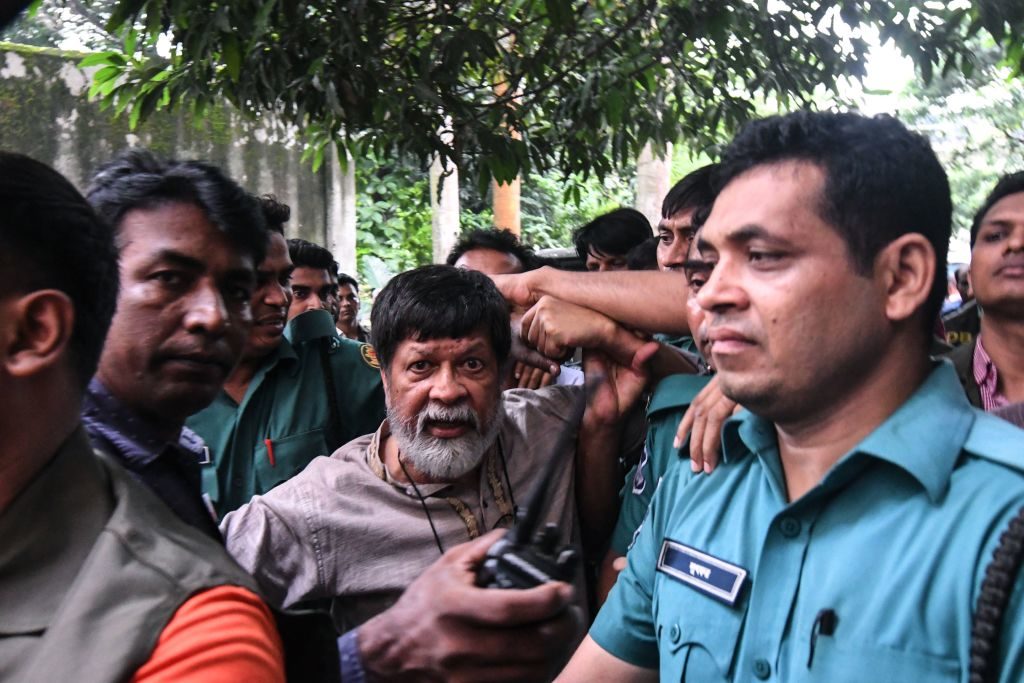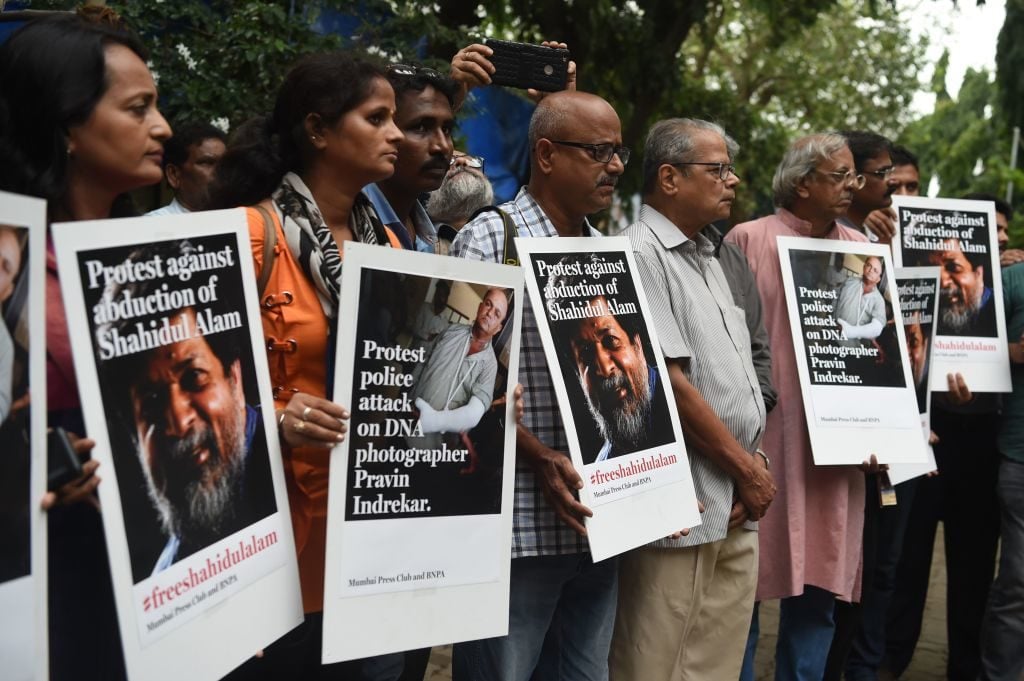Politics
After an International Outcry From Activists and Artists, Photographer Shahidul Alam Is Finally Granted Bail in Bangladesh
The news is a big win, say Alam's supporters—but the fight isn't over.

The news is a big win, say Alam's supporters—but the fight isn't over.

Ben Davis

Bangladeshi photographer and activist Shahidul Alam has been granted bail today by a court in Dhaka. Since his arrest on August 5, Alam’s case has drawn support and scrutiny from around the world, as well as protest within Bangladesh itself.
The 63-year-old Alam, a legend of engaged photography, was detained under the government’s notoriously draconian Information and Communications Act for “provoking people and spreading false information and propaganda against the government,” after making statements critical of the government in solidarity with student protesters.
In a post to the FreeShahidul Facebook page, Alam’s lawyers Sara Hossain and Jyotirmoy Barua summarized the day’s news:
Today the High Court granted bail to Dr. Shahidul Alam after 102 days in custody. For granting him bail, the court notes that he did not make any confessional statement admitting to any of the allegations made against him. The court also noted that the statements that were made in the police record is completely different from and inconsistent with the interview that he gave with Aljazeera. We should point out that throughout this case the state’s lawyers have insisted that Dr. Alam’s statements amounted to hurting the image of the nation and instigating violence; when in fact the state’s lawyer never even put the Aljazeera interview into the police case or on the record. The court also said, two of the other reasons for granting Dr. Alam bail were that he is an elderly person, and an eminent photographer known throughout the world. And, more importantly, the police still has not submitted its investigation report and it is unclear when they are going to do so. He definitely deserves bail. We are very pleased to have got this order after so many days. We very much hope that the government would respect the order of the court and not in any way further what has already been a grotesque miscarriage of justice.
Hossain told Al Jazeera that they hoped Alam would be released by Sunday. Bangladesh’s attorney general, Mahbubey Alam, has been quoted as saying that the government will appeal the decision.

Sofia Karim (left), niece of Shahidul Alam, poses with artist Tania Bruguera, during a protest for the jailed photographer at the Tate Modern. Courtesy of Sofia Karim.
What does this new development mean? Sofia Karim, Alam’s London-based niece, explained to artnet News by email that there were two aspects to the case, the investigation against him and the bail:
This is a win for supporters in relation to the first part: the bail. But we still have to keep campaigning for the case itself and all charges to now be dropped. He could indeed still be prosecuted if this case is pursued by the government and they win. We don’t even know what charges they may bring against him. Our wish now is that he comes out of jail as quickly as possible on bail, and that there is no delay or obstruction in the implementation of this.
The positive news comes after more than 100 days in jail for Alam, which included alleged torture during his initial detention. His persecution has drawn criticism from human rights groups, artists, and activists from around the world.

Indian photographers and journalists gather outside the Mumbai press club to protest the arrest of activist and photographer Shahidul Alam in Dhaka, in Mumbai on August 7, 2018. Photo courtesy of Punit Paranjpe/AFP/Getty Images.
Most recently, to mark his 100th day of detention on Tuesday, more than 30 prominent South Asian intellectuals and activists released a letter to Bangladesh’s Prime Minister asking for Alam’s release. The signatories included actress and filmmaker Aparna Sen, writer Amitav Ghosh, historian Ramachandra Guha, women’s rights activist Vrinda Grover, artist Anish Kapoor, novelist and poet Vikram Seth, and photographers Dayanita Singh and Raghu Rai. It read in part:
As believers in the rule of law, we are shocked to learn that government lawyers continue to oppose Shahidul Alam’s release on bail using various stratagems and delays intended to deprive him of his fundamental rights to liberty and due process. Across South Asia, politicians and citizens have fought for the right to speak, and to write, and it is astonishing to us that a government today, especially one which seeks to harness technology for progress, should choose to use a law to proscribe online speech to jail a citizen.

Arundhati Roy. Image courtesy of Wikimedia Commons.
Booker Prize-winning author Arundhati Roy was among the signatories of that letter, and also circulated her own open letter in praise of Alam, published yesterday. Referring to the much-criticized Section 57 of the ICT Act, under which he was arrested and under which scores of activists have been picked up for expressing opinions critical of the government, Roy wrote:
What sort of law is this, this absurd, indiscriminate, catch-all, fishing trawler type of law? What place does it have in a country that calls itself a democracy? Who has the right to decide what the correct “image of the state” is, and should be? Is there only one legally approved and acceptable image of Bangladesh? Section 57 potentially criminalises all forms of speech except blatant sycophancy. It is an attack not on intellectuals but on intelligence itself. We hear that over the last five years, more than 1,200 journalists in Bangladesh have been charged under it, and that 400 trials are already underway.
Though expressing relief at the news, Alam’s partner, Rahnuma Ahmed, also continued to emphasize the broader context of the crackdown on freedom of expression enabled by the Information and Communications Act. “I hope journalists, photographers, and academics will launch a united struggle for repealing undemocratic provisions of Digital Security,” she told Al Jazeera.